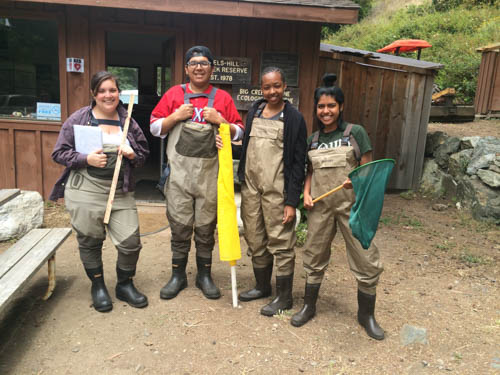Campus News
National Academies report on sustainability education features UC Santa Cruz expertise
UC Santa Cruz professor Anne Kapuscinski chaired the committee that developed the report, and campus initiatives were highlighted within as examples of innovative sustainability education.

The National Academies of Sciences, Engineering, and Medicine released a report this fall that puts UC Santa Cruz in the spotlight as one of the national leaders in sustainability education.
The report issued a comprehensive set of recommendations for educational institutions, federal agencies, and professional societies to strengthen sustainability curricula and programs. The committee that developed it was chaired by Anne Kapuscinski, a UCSC environmental studies professor and director of the Coastal Science and Policy Program. Campus initiatives were highlighted within the report as examples of innovative sustainability education, and the findings will be presented at several upcoming national conferences.
“This has helped bring more national attention to the groundbreaking sustainability work that UC Santa Cruz has done for a long time,” Kapuscinski said. “We are innovators, and we’ve been first-movers in a lot of programs that are directly relevant to sustainability, even though they might not have ‘sustainability’ in the title.”
The Coastal Science and Policy Program, for example, was featured in the report for its intensive use of experiential learning to build sustainability leadership skills. Graduate students in the program spend a year embedded with a partner organization to implement a co-designed capstone project that delivers scalable solutions to a coastal sustainability challenge.
“We’re immersing students in a much deeper way,” Kapuscinski explained. “They’re challenged to figure out how to address complex problems and develop solutions in a real-world setting, and to navigate all its nuances.”
The committee that produced the report held one of its national workshops at the UC Santa Cruz Coastal Science Campus as part of the development process. During their visit, they also toured the Center for Agroecology & Sustainable Food Systems (CASFS) and learned how it uses the campus as a living laboratory and forges tight connections between formal curricula and hands-on practice.
“CASFS has been doing that for many years, long before the recent flourishing of sustainability education programs nationally and internationally,” said Kapuscinski.
Experiential learning was one of the report’s main recommendations, alongside fostering interdisciplinary approaches and building diversity, equity, and inclusion. Campus leaders see both strength areas and growth opportunities among those themes. Diversity was a primary focus for Kapuscinski and the committee in developing the report, and Social Sciences Division dean Katharyne Mitchell was thrilled to see that message come across loud and clear in the final product.
“Bringing in diversity of experience is still a growth area for us, even though we have long aspired to it and worked toward it,” Mitchell said. “You have to be really proactive and do the work to attract people to your programs and establish a climate that helps people succeed.”

Mitchell had an opportunity to speak with the committee during the workshop held at UCSC, as did Erika Zavaleta, a professor of ecology and evolutionary biology. Zavaleta leads initiatives like the Center to Advance Mentored, Inquiry-based Opportunities in Ecology and Conservation (CAMINO) and the Doris Duke Conservation Scholars program, both of which are working to increase diversity.
“The interest is absolutely there to be able to recruit people from a huge diversity of backgrounds to sustainability work,” Zavaleta said. “It’s an issue of sharing leadership and agency in the field enough that all of that diversity can be reflected in what sustainability is and how it’s pursued.”
Zavaleta says the Doris Duke Conservation Scholars and CAMINO programs have developed successful support models that focus on community-building, outreach, and representation in leadership. Now, she’s working to share those insights across the campus community and beyond.
UC Santa Cruz programs also have important lessons to share when it comes to fostering interdisciplinarity. The Environmental Studies Department offers a doctoral program and five undergraduate programs—including a new agroecology major—all of which combine education in natural sciences and social sciences. Department chair Weixin Cheng says he’s found that true collaboration across disciplines requires the right culture among faculty.
“Our departmental members have this mindset that we are solving these environmental problems together,” he explained. “We can be very different in terms of our perspectives and training, but the goal is always shared.”
UC Santa Cruz also offers an interdisciplinary sustainability minor housed at the Rachel Carson College. That program emphasizes green entrepreneurship, along with sustainable design for the built environment. Cross-cutting skills like those are increasingly in demand on the job market, and the new report’s official endorsement of interdisciplinary education could help to accelerate that trend.
Overall, each of the report’s recommendations are intended to help the field of sustainability grow in the right direction. That goal inspired Professor Anne Kapuscinski to accept the chair position on the committee in the first place. And looking back, she’s glad she did.
“It really was a labor of love,” Kapuscinski said. “It’s a lot of work to serve on a National Academies committee, but you learn so much from it and get to contribute to the national dialogue on timely issues. It was both an honor to lead and a joy to collaborate with the other national leaders on this committee.”